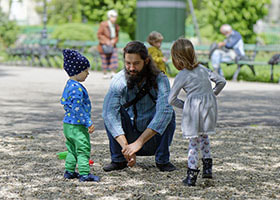|
In this video, Sybil discusses how we hold space for hope in the therapy room with our domestic abuse clients; both when they are feeling hopeless and, on the other hand, when our clients are hopeful about a situation we, as therapists, see as unrealistic or hopeless.
0 Comments
By Sybil Cummin, MA, LPC, ACS  Violence in the home affects all that live there, especially the youngest ones who have no escape. In these cases, it can be helpful to have Child Protective Services (CPS) involved to help monitor and maintain safety for the children in the home. CPS can provide resources for housing, childcare, mental health services, and supervised visitation monitoring for the abusive parent/partner. In theory, these services will help the non-abusive parent leave the relationship and find safety for themselves and children; however, this is not always the case. And what about the cases that never make it onto the radar of CPS? Family Court, due to divorce and custody issues, is also commonly involved with these families. Many times when judges are trying to determine what is in the best interest of the children, supervised visitation can be ordered to help monitor and assess the safety of a parent. The goal is to do what is in the best interest of the children; unfortunately, this is also not always the case. If your facilitator does not have the proper education and understanding of domestic violence, these supervised visitations can allow abuse to continue. “Based on what you have shared with me today, I am going to have to call Child Protective Services.”10/15/2020 By Sybil Cumming, MA, LPC, ACS  “Based on what you have shared with me today, I am going to have to call Child Protective Services.” This sentence will put the fear of God into any parent’s heart. “They are going to take my children” may be the first coherent thought after that gut-wrenching feeling. It doesn’t matter if you have had experiences with child protective services (CPS) in the past or if you have never even known anyone who has had any contact with them before. This sounds scary. As mandated reporters, it is our job to call CPS if we suspect that there is a situation when children are being put in harm’s way. It is not our job to investigate the situation and make the determination if, in fact, these children are at risk for abuse, neglect, or even death. It is solely our job to make the phone call. By Sybil Cummin, MA, LPC, ACS Note: While the statistics show that males perpetrate violence towards females at a much higher rate, women can also perpetrate domestic violence.  While our family court systems say their decisions are based on the best interests of the children, the evidence proves otherwise. Research suggests that in an estimated 30 to 60 percent of the families where domestic violence is identified, some form of co-occurring child maltreatment is also present (Children’s Hospital of Philadelphia Center for Injury Research and Prevention). One North American study found that children who were exposed to domestic violence were 15 times more likely to be physically and/or sexually abused than the national average (Volpe, 1996). And yet, domestic violence is not a major factor in determining who has access to unsupervised time with the children. I have several clients who have shared that attorneys have told them NOT to say anything about their experiences of domestic violence during family court proceedings as there are typically WORSE outcomes regarding parenting time and decision making for those who report the violence they have experienced. And as I talk with other professionals working with victims of domestic violence, this is not a small issue that is isolated to my community. Talking about domestic violence is considered the “kiss of death” by many family court attorneys. By Sybil Cummin, MA, LPC, ACS  Understanding why your abuser does what they do can be extremely helpful in the initial stages of the healing process. You can see the patterns of behaviors to gain and maintain power and control and start to challenge the effects of gaslighting, learning that you are not crazy. Your experiences are real. This psycho education is also helpful in managing the effects of post separation abuse. Understanding the tactics your abuser will use when going to family court or how they will use your children to continue abuse can also help you prepare and stay resilient. There is also a time when focusing on the mind of your abuser can lead you down the crazy making rabbit hole. Do they really believe the s#*% that comes out of their mouths? How can they continue the lies when the evidence is stacked up against them that proves they are lying? Do they truly believe that no one can touch them? That they are invincible? By Sybil Cummin, MA, LPC, ACS In this video, Sybil discusses how clinicians and attorneys can best support clients, who have experienced abuse, navigate the legal system, particularly when Orders of Protection have been broken. For more videos, visit our Videos page or check out the Beyond Power and Control YouTube Channel.
By Sybil Cummin, MA, LPC, ACS  1. Taking Control of the Timeline of the Case If your client is hesitant or fearful to testify, their abuser knows it. How can the abuser use this to their advantage? They can use different tactics to continue the case. Some of these cases take over a year for the jury trial to occur, forcing your client to show up to court each time, experiencing all of the anxiety that occurs with this, only to find out that the case will be continued for another 6-8 weeks. This can happen numerous times for numerous reasons. This also effects other potential witnesses. By Annonymous  You have found yourself on the other side of separation from an abusive ex-partner and are wondering what is next. In the best of circumstances, separation and divorce is tough. In the worst of circumstances, such as leaving an abusive relationship and particularly if you share children with your ex, you will end up in situations where you have to interact. Here is some brief information and internet resources on how to navigate this situation for yourself and your children in the best way. Co-Parenting or Parallel Parenting? In a perfect world, a couple can separate and continue to peacefully and amicably work as co-parents to raise their children. In cases of abuse, however, this is considered inappropriate. National Domestic Violence Hotline has recent research published, which boldly states that interactions such as couple’s counseling is contraindicated for survivors. By Catherine Wilson, LPC, ACS of LifePaths Counseling Center in Littleton, Colorado  A question I have heard many times as a counselor is: “Is this abuse?” It is a common one that people ask themselves when they are trying to understand what is going on in a relationship that just feels wrong. It is also common for people to ask family and friends. A short answer to the question might be, “yes it probably is,” if the client is asking that question. However, it also isn’t that simple. There are many ways that people describe it when something is unhealthy in a relationship, and also many ways for others to interpret it. |
AuthorSybil Cummin, MA, LPC, ACS Archives
February 2021
Categories
All
|
